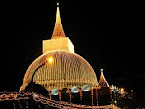“Bruce is a strong follower of his leader. He has been assigned a mission by his leader to steal a sacred object which is hidden in a highly protected place. His belief in his faith and leader tempt him to remove any obstruction on his way by any means including murdering. He is burning with hatred to kill the possessor of the object as instructed by his leader. But he had to kill two more people without premeditation with unbearable anger as those two mislead him in finding the place of the sacred object. At the end he killed the possessor and finally found the sacred object and stole it with joy in view that he did a sacred service to his leader by stealing the sacred object.”
Consciousness rooted in attachment (Lobha mulika chiththas) – 8:
(1) Somanassa sahagatha Dhittigatha samprayuktha Asankharika Chiththa
Consciousness accompanied by pleasure connected with wrong view and unprompted
(2) Somanassa sahagatha Dhittigatha samprayuktha Sasankharika Chiththa
Consciousness accompanied by pleasure connected with wrong view and prompted
(3) Somanassa sahagatha Dhittigatha Viprayuktha Asasankharika Chiththa
Consciousness accompanied by pleasure disconnected with wrong view and unprompted
(4) Somanassa sahagatha Dhittigatha Viprayuktha Sasankharika Chiththa
Consciousness accompanied by pleasure disconnected with wrong view and prompted
(5) Upekkha sahagatha Dhittigatha samprayuktha Asankharika Chiththa
Consciousness accompanied by indifference connected with wrong view and unprompted
(6) Upekkha sahagatha Dhittigatha samprayuktha Sasankharika Chiththa
Consciousness accompanied by indifference connected with wrong view and prompted
(7) Upekkha sahagatha Dhittigatha Viprayuktha Asasankharika Chiththa
Consciousness accompanied by indifference disconnected with wrong view and unprompted
(8) Upekkha sahagatha Dhittigatha Viprayuktha Sasankharika Chiththa
Consciousness accompanied by indifference disconnected with wrong view and prompted
Lobha or attachment is the likeness, lust, greed or passion for beautiful, attractive or desirable sensual objects. Displeasure is not associated with lobha mulika chiththas. Therefore, there is one class of lobha mulika chiththas associated with pleasurable feeling (somanassa vedhana) and another with indifference feeling (upekkha vedhana).
Impression that there is no sin and merit, no results of bad kamma, nothing wrong with doing any evil act to accomplish one’s mission is a “False View”. “Dhitti” mentioned in lobha mulika chiththas refers to this false view. Consciousness with either pleasurable or indifference feelings would again connected with false view (dhittigatha samprayuktha) or disconnected with false view (dhittigatha vipprayuktha). Finally, one class of these chiththas arise unprompted (asankharika) and another being prompted by oneself or another (sasankharika) which makes the number of chiththas 8.
At the instance Bruce steal the sacred object the consciousness arise is the above (2)nd as he did it with joy (somanassa sahagatha), he thought stealing was a sacred service (dhittigatha samprayuktha) which is a false view and he did it been prompted by his leader (sasankharika). Similarly, depending on the feeling, view and temptation either of the above chiththa would arise at an act of attachment (lobha).
Consciousness rooted in ill-will or aversion (Dwesha mulika chiththas) – 2:
(9) Domanassa sahagatha Patigha samprayuktha Asankharika Chiththa
Consciousness accompanies by displeasure connected with ill-will and unprompted
(10) Domanassa sahagatha Patigha samprayuktha Sasankharika Chiththa
Consciousness accompanies by displeasure connected with ill-will and prompted
When ill-will, aversion, anger or hatred is there, the feeling experienced in chiththa is always associated with displeasure (dhomanassa). Dwesha mulika chitthas are always connected with ill-will (patigha samprauktha) and arise either unprompted (asankharika) or prompted (sasankharika).
Killing is always done with hatred feelings, ill-will and aversion. Therefore at the instance of killing either of the dwesha mulika chiththas arise. In the above story when Bruce kills the possessor of the object the above 10th chiththa arises as he had been instructed to do it by his leader (sasankharika). When he performed the other killings it was the 9th chiththa as he did it without premeditation (asankharika).
Consciousness rooted in delusion or ignorance (Moha mulika chiththas) – 2:
(11) Upekkha sahagatha Vichikichcha samprayuktha Chiththa
Consciousness accompanied by indifference and connected with Doubts
(12) Upekkha sahagatha Uddhachcha samprayuktha Chiththa
Consciousness accompanied by indifference and connected with Restlessness
Moha mulika chiththas occur due to the dullness or unawareness of mind at the time of performing a certain act. Therefore the feeling associated with these two chiththas is indifference (upekkha). Vichikichcha is the doubt about 8 places including Buddha. Uddhachcha is the restlessness of mind. When one is unable to concentrate on a certain object or aspect, consciousness arise is associated with restlessness (uddhachcha).
There are 10 kinds of evil acts committed by Deed (Kaya), Word (Vachanaya) and Thought (Sitha) described in Buddhism. At the time of committing any of these evil acts one or more of the 12 types off immoral consciousness arises. It is important to understand that in a fraction of a second there are hundreds and thousands of chiththas arise (uppadha), ongo (thithi), and terminate (bhanga). But at one instance only one chiththa arise and as soon as it terminates another chiththa arises. For example when performing killing 9th or 10th consciousness presides but in the whole process of killing other chiththas may also arise depending on the mental state of the person.









0 comments:
Post a Comment